Niran Okewole is a prolific and celebrated poet, a playwright, an essayist and a trained psychiatrist. He is a consecutive two-time winner of the MUSON Festival Poetry Prize, in 2002 and 2003, and the recipient of the Sawubona MusicJam/Berlin International Poetry Festival Prize in 2008. Niran was a festival guest at the 2015 Ake Arts and Book Festival. His new volume, The Hate Artist, is published by Khalam Editions in 2015.
Niran Okewole speaks with Tope Salaudeen-Adégòkè at Artmosphere, University College Hospital, Ibadan where he was hosted as the literary club’s guest of the month. In this following interview, he talks about his new poetry volume, The Hate Artist, his ideological and philosophical outlook and sheds insight into his work and craft.
***
The Hate Artist is a decade break after your debut poetry collection, Logarhythms. The disparity of years between the first and second volumes is a pointer to your commitment, no? Could you speak about the formative years, and how long does it take you to write?
Between Logarhythms and The Hate Artist, there was as you observed, a decade, half of which went into my psychiatry residency training and active participation in the struggles of the medical associations, while the other half went into psychiatry research and academic writing. As such, the pace of creative writing was slow. But I don’t think the commitment to artistic duty ever really waned; it was always there.
As for the formative years, I suppose those are still unfolding, but maybe we could talk about the years leading up to publication of Logarhythms, the years between the two books, and what is happening now. Taking that long view, poetry has always been in my consciousness. I recall copying out one of those Yoruba poems in Alawiye as a 6, 7-year-old boy. My dad liked it and pinned it up in his office, and thereafter I was the poet to his friends. I discovered African poetry on the pages of Senanu and Vincent’s Selection of African Poetry while in secondary school, and about the same time I discovered the English romantic poets—Shelley, Tennyson, Wordsworth, Keats—in Children’s Britannica. That was pretty much my view of poetry at the time, and I wrote a few imitations which were eventually packed into one metal bin and burnt during that break between finishing secondary school and entering university. I think by then I had more or less come to recognize all those rhymed stanzas as just so much crap.
By the time I was in medical school I had discovered Eliot and Auden, who came to represent pretty much the type of poetry one was striving for. My first collection was heavily influenced by these guys, and Soyinka of course. In the intervening years there has been a quest to evolve my poetics, and the thematic concerns came to crystallize along the lines into which The Hate Artist is divided. During this period, I have been paying particular attention to the work of Seamus Heaney, Paul Muldoon and Derek Walcott. And, from an ideological point of view, Pablo Neruda. The critical essays of Helen Vendler have also been very instructive. But the process of development and self-invention is not over. Presently I am trying to do some longer work, which is going with a study of poets like Femi Oyebode and Tade Ipadeola, together with Derek Walcott and Wallace Stevens.
How long it takes to write is a difficult question to answer. Some poems are done in less than a month. And then I have some ideas that I’ve been nurturing for over five years, that I know won’t be done for another decade.
The volume is splendid and brimming with metaphorical variance and depth. It is a book that is deepening, elegant, with attention to linguistics testing and shows a respectable command of English. The poetics of the volume startle, and I could say, may not be an easy read for general readers. Are you of the opinion that poetry is not meant for poetry’s sake? As Prof. A. C. puts it in his Oxford Lectures of Poetry, “Poetry for poetry’s sake”, are the readers to consider poetry in its essence, are they to regard poetry in metrical form? To borrow his words, what does the formula ‘Poetry for poetry’s sake’ tell us about this experience?
There’s actually a constant personal dialogue between two warring factions in my poetics: the desire, like Neruda’s populism, to be accessible, and the unrelenting fascination with depth and ideas. Needless to say, there is a constant process of examining these positions but some governing principles have emerged with time. The first, learned from Yeats, is that good poetry is polysemic—open to multiple interpretation and reinterpretation. The second, closely related to this, is that it is possible to have layers of meaning and poetic enjoyment—that it is possible for the most superficial reader to engage with the most basic sound and sense of each poem, while a more informed and perceptive reader would be able to mine the depths for hidden allusions and layers of meaning. To this end, I have tried to keep the syntax simple and occasionally playful. Which of course is a slippery slope; whether one succeeds or not in this regard is a matter of opinion given each reader’s antecedents, predilection and ideological, thematic or stylistic baggage.
There is a school of thought that says that poetry should never be a vehicle for ideology. I have a section in The Hate Artist which is all about breaking that rule, and another section which is all about offering a thesis, that poetry can serve the cause of science and medicine, rather than these two pursuits being seen as two different worlds. So it’s pretty much like sticking my neck under the guillotine. The notion that poetry, or if we must generalize to all art, should be merely for art’s sake, is something I associate, rightly or wrongly, with the romantics. In my own private parody of Eliot, I am a classicist in literature, socialist in politics, and existentialist in philosophical orientation. Inevitably, there is embedded within each ethos the idea of interventionist literature—the classicists want literature to be a vehicle for ideas (as opposed to romantic navel-gazing), the socialists want literature as a tool for raising popular consciousness, and from existentialists like Sartre and Camus we get the idea of l’homme engage. The rule, if one could venture such a perilous thing, is that regardless of whatever use one wishes to put poetry, or art in general, it must work first and foremost by the rules of that genre or medium.
About the themes of the volume. There is the internationalism grip about terrorism and insurgency, especially in the titular poem, “The Hate Artist”. By putting the readers in the mind of terrorists, what apprehension do you seek?
The collection barely disguises the fact that it clusters along three lines: the general business of poetry, poems related to science and medicine, and poems of a political orientation. The title poem comes from that third group, and is an attempt to engage with the state of the world we live in. Half a century ago, the biggest fear of the engaged intellectual was of nuclear annihilation in the context of the cold war. Today, that nuclear threat is embedded within the matrix of terrorism along fundamentalist lines, and the reductionist emotion which governs this is hate for the Other. That is very much evident today not only in the emergence of groups like ISIS and Boko Haram, but even in direct descendants of the Ku Klux Klan such as Donald Trump. The fact that such a figure is the presidential frontrunner on the platform once held by Abraham Lincoln, who is enjoying so much support from Christian fundamentalists despite very obvious hate rhetoric, is, as Lacan and Zizek would say, a symptom of the conscious and unconscious drives in a putative enlightened society like America. So the spectre of hate is a global phenomenon, which goes to the heart of human nature. As Auden once wrote, ‘We must love one another or die.’
In another brush stroke you talk about globalized violence, post-colonialism, imperialism, stuttering state of African countries, amongst others. One, could an African poet really afford to be apolitical; two, the colonial experience of African countries, could merely theorizing about it really change the impact?
Yes, it is possible for an African writer to be apolitical; in fact, one of the mantras you find bandied around by the new generation of emerging writers is ‘the danger of a single story’, for which read: Africa is not just about suffering and failed politics. So you find the sociopolitical novel, once the staple of African literature, now denounced as ‘poverty porn’, among other things. This is not necessarily a bad thing: you find for instance a feisty attempt to redefine what should be the standard for judging African literature, contesting this discourse with western received ideas and expectations of prize awarding bodies. So there is something of a seismic shift, which is becoming more evident in the creative output. I believe however that it would be a mistake to abandon politically engaged literature, and it is gratifying to see that many writers haven’t done that. If anything, the best writers are striving for subtlety as opposed to direct sociopolitical statements. As said earlier, each work has to stand or fall by the rules of each genre or medium.
On postcolonialism, yes, there are two or three poems in which I try to take on this ideological template, including a mini-biography of the beloved Frantz Fanon. He it was that said that the juxtaposition of the white and black races has created a psycho-existential complex, which he sought to destroy by analysis. I paraphrase, but something along those lines. The import of this, in answering your question, is that analysis, properly deployed, is a powerful tool for liberating consciousness. That is closely allied to what Amilcar Cabral has described as the weapon of theory. I think that is particularly important in a knowledge economy like we have today. A close look at contemporary movements, mostly for democratic change, whether in Africa, the Middle East, or on Wall Street, shows that the best efforts were galvanized by theory and ideology creatively deployed in the burgeoning public space, often using social media. Of course, the idiocy and crassness of reactionary forces is also deployed by the same medium, making this very much a virtual battlefield. The role that literature can serve is as a springboard for positive discussion. But this is only one stage in a process. I would probably rephrase Auden and say that poetry, though a powerful tool, by itself makes nothing happen.
You express optimism in the world as a den of hope because it is in continuum, when do you think this hope could materialize?
That question presupposes a Judeo-Christian perception of time as linear. If one perceives time as cyclical, that hope of an eventual outcome is futile. I like the way Camus deployed the myth of Sisyphus as an existential parable. Even when hope seems futile, one defines oneself by a capacity for positive action.
Some of the poems in the volume are itinerary poetry of places you have travelled to. What is a poet’s role in mapping the world?
I like the way you describe that, mapping the world, because in a certain sense this is about the cartographic function of poetry. Poetry could reach over vast expanses of time and place, but it could also localize itself and define once and for all time the complex of emotions and ideas that we experience in thinking about specific places. I’m thinking of Ezra Pound’s classic definition of what an image is. Probably no poem better exemplifies this than J.P. Clark’s Ibadan, but there have been others, like when Osundare writes about his native Ikere Ekiti, or when Neruda writes about the heights of Macchu Picchu, or when Soyinka, in a different mythological/metaphysical sense, writes about Idanre. These places become synonymous with the poems that you know about them, among other cultural artifacts.
There is copious bibliographical and historical allegory in your poetry. And names, too. It shows you are steeped in learning, yet you are also a medical practitioner, a psychiatrist, that reflects in your diction. How do you find time between these? And you talked about dropping names, is that some kind of metaphor and verismo for you?
Like I pointed out at the end of the volume, I have over my two volumes adopted a modus op that is pretty much like reverse transcription, making poetry out of the myriad of ideas, people, cultural and intellectual experiences that have fascinated me. These are nuggets that have been accumulating more or less since my mid-teens, in a slow deposit. I believe writing of this sort imposes a duty of referencing either subtly or overtly the sources of the imagery. But I’ve encountered some lazy or apathetic readers who, rather than seeing those allusions as a stimulus, would rather write them off as exercises in name dropping. I thus felt some hint of some sort was required. The poem of that title was composed under a somewhat different impetus.
You made references to Socialist thinkers and revolutionaries; do you subscribe to Africa’s pioneer of this ideology that Africa must look left if it is ever to move forward politically and economically? Could you speculate how soon and possible is this dream of these pioneers?
I first found myself in the grip of socialist ideology in my mid-teens, after a friend smuggled out copies of his dad’s Marx and Engels to me. We were in secondary school then; incidentally, his mum also had a tidy collection, including Hemingway’s Old Man and the Sea. The dad became a mentor of sorts and is acknowledged in one of the poems in my collection. I very recently chose to end my over a decade of affiliation with one of the socialist formations in Nigeria, opting for the path of independent socialism. In a sense that is about sticking to a common pool of ideology while repudiating groupthink. This in a sense is like personalizing the history of left movements, which has been characterized by a lot of internal wrangling to the detriment of collective agitation. Perhaps because there are so many possibilities for divergence. As such a left turn is difficult to speculate on. One of the major tasks before the present generation of minds on the left is to update socialist ideology – too many comrades have a fossilized consciousness; you would think nothing of value has been written after Lenin. I very much like Trotsky’s ideas about permanent revolution and the transitional program. These are not too far removed from what you might want to call the broad liberal consensus – our shared ideas about democracy, development, transparency, human rights and the rule of law. Beyond these come the questions about how the commanding heights of the economy are owned and managed, and the need to challenge this neoliberal capitalist consensus which is a template for inequality, as even bourgeois economists like Thomas Piketty are beginning to argue. And we don’t have to go all the way to Russia or China for models. There remain to this day concrete reminders of the accomplishments of Awolowo in the old Western Region, of Lateef Jakande in Lagos. These were administrations that deployed public resources to provide enduring public infrastructure. But in a world where labour union leaders sit on Bureau of Public Enterprises, overseeing the sale of the common wealth to a few, the ideological lopsidedness is eye-watering. Perhaps these are the small victories we should strive for, rather than one massive chaotic ‘revolution’. That is the way of democratic socialism, rather than the communist ethos championed even by some people who call themselves democratic socialists.
There is a slight touch of meta-reality in the book and I am poised to ask, your poetry is so modern yet borrows from this; is that to perpetrate or show the Africanism in your poetry or to it was just spontaneous?
I think the meta-realist tendency is just another feature of the general cosmopolitan outlook of the whole collection, not exclusively an Africanist influence. Of course, one thinks readily about Tutuola and Fagunwa and Ben Okri, But I believe the backdrop also includes the novels and stories of South American writers like Gabriel Garcia Marquez and Mario Vargas Llosa and Jorge Luis Borges that I have read and loved tremendously; even Isabel Allende who I am reading presently. But it also includes Europeans like Gunter Grass who I am also reading at the moment, not to forget Franz Kafka whose story, The Hunger Artist, influenced the title poem. So I am constrained to describe this as Africanist. One of my contentions, on different platforms, is that we should be wary of isolating certain aesthetic or methodological approaches as exclusively African. Another commonly misappropriated feature is orality: I have been accused of not being an ‘African’ poet because I do not portray the orality of some of our most illustrious poets. The first point that needs to be made is that orality is not an exclusively African preserve. We see vestiges of orality in verse from the Caribbean, from Europe, from other parts of the world. We need to define ourselves first as humans—not different, lest we be deemed inferior—and it is within that commonality that we can identify subtle variations.
**********
About the Interviewer:
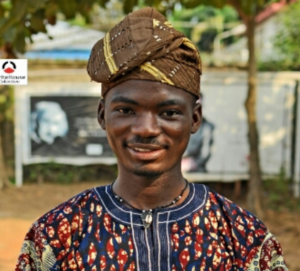 Tope Salaudeen-Adégòkè is an editor, literary critic and poet from Ibadan, Nigeria. A member of WriteHouse Collective, Tope assesses manuscripts for publication and is one of the organizers of Artmosphere, a leading monthly literary event in Ibadan. Also, he is the administrator of the Kofi Awoonor Memorial Library in Ibadan and is a book reviewer at Wawa Review of Books, Abuja, Nigeria. He enjoys travelling and cooking. @LiteraryGansta is his alter-ego on Twitter.
Tope Salaudeen-Adégòkè is an editor, literary critic and poet from Ibadan, Nigeria. A member of WriteHouse Collective, Tope assesses manuscripts for publication and is one of the organizers of Artmosphere, a leading monthly literary event in Ibadan. Also, he is the administrator of the Kofi Awoonor Memorial Library in Ibadan and is a book reviewer at Wawa Review of Books, Abuja, Nigeria. He enjoys travelling and cooking. @LiteraryGansta is his alter-ego on Twitter.


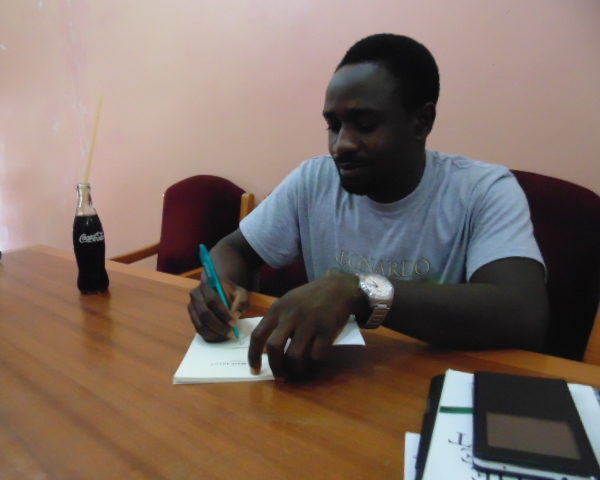
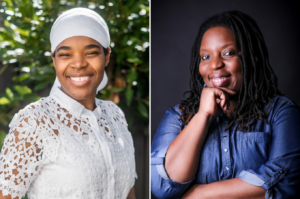
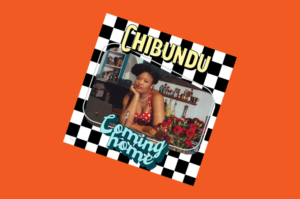

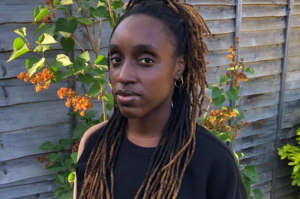



COMMENTS -
Reader Interactions